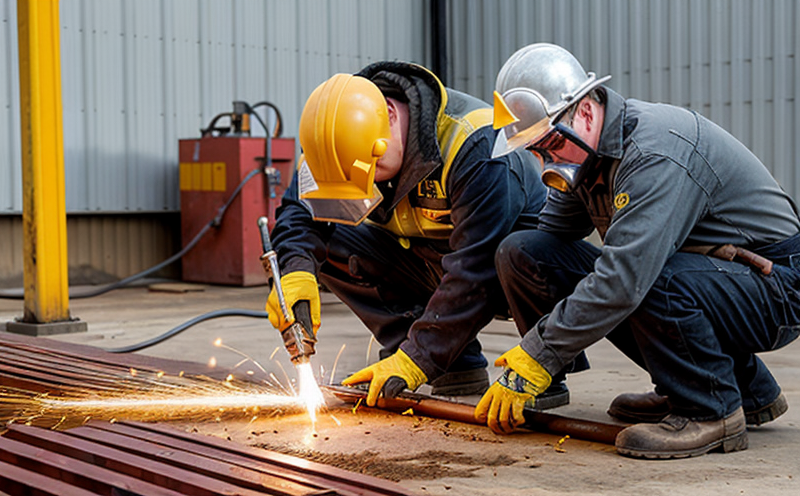The Importance of Weld Inspection Ensuring the Reliability and Safety of Critical Assets
In todays manufacturing landscape, welds play a critical role in the construction of numerous industrial assets, including pipelines, bridges, tanks, and pressure vessels. The integrity of these welds is paramount to ensuring the safety and reliability of these assets, as well as protecting against costly downtime and potential environmental disasters. This is where Weld Inspection comes into play a laboratory service offered by Eurolab that provides an unbiased evaluation of welded joints.
What is Weld Inspection?
Weld Inspection is a rigorous testing process that involves evaluating the welds of critical industrial components to identify any defects or anomalies. Our expert technicians use state-of-the-art equipment and techniques, including radiography (X-ray), ultrasonic testing, magnetic particle inspection, and other non-destructive evaluation methods, to assess the quality and integrity of welds.
The primary objective of Weld Inspection is to verify that welded joints meet specified industry standards and regulations. This ensures that critical assets are constructed with confidence, minimizing the risk of failures, leaks, or explosions that can have devastating consequences for businesses, communities, and the environment.
Why is Weld Inspection Essential for Businesses?
Investing in Weld Inspection may seem like an added expense, but it offers numerous benefits that far outweigh the costs. Here are some key advantages of utilizing this laboratory service
Ensures Compliance with Industry Standards By conducting regular weld inspections, businesses can ensure compliance with relevant industry standards and regulations, such as those set by ASME, API, and AWS.
Reduces Risk of Downtime and Accidents Weld inspection helps identify potential defects or anomalies before they become major issues, minimizing the risk of equipment failure, accidents, and costly downtime.
Protects against Environmental Disasters By verifying weld integrity, businesses can prevent catastrophic events like pipeline ruptures, tank collapses, or pressure vessel explosions that can have devastating environmental consequences.
Enhances Productivity and Efficiency Regular weld inspections enable manufacturers to identify areas for improvement, optimize production processes, and reduce the need for costly repairs or rework.
Builds Customer Confidence and Reputation By prioritizing weld inspection, businesses demonstrate a commitment to quality and safety, enhancing their reputation among customers and stakeholders.
Key Benefits of Weld Inspection
Accurate Diagnosis and Identification Our expert technicians utilize advanced equipment and techniques to accurately diagnose defects or anomalies in welded joints.
Comprehensive Reporting and Analysis Detailed reports provide actionable insights, enabling manufacturers to make informed decisions about maintenance, repairs, or upgrades.
Cost Savings through Preventative Maintenance Regular weld inspections help prevent costly downtime, rework, and potential environmental disasters.
Enhanced Safety and Reliability Verifying weld integrity ensures the safe operation of critical assets, protecting personnel, equipment, and the environment.
Improved Quality Control and Assurance By incorporating weld inspection into production processes, manufacturers can ensure consistent quality and meet industry standards.
QA Weld Inspection FAQs
Q What types of materials are suitable for Weld Inspection?
A Eurolab offers Weld Inspection services for a wide range of materials, including carbon steel, stainless steel, aluminum, copper, and more. Our expert technicians will assess the materials properties to determine the most effective inspection method.
Q How often should I conduct Weld Inspection on my assets?
A The frequency of weld inspections depends on various factors, such as asset type, operating conditions, and regulatory requirements. Eurolab can work with you to develop a customized inspection schedule tailored to your specific needs.
Q What types of welding processes are supported by Weld Inspection services?
A Our expert technicians support a range of welding processes, including Shielded Metal Arc Welding (SMAW), Gas Metal Arc Welding (GMAW), and Flux Cored Arc Welding (FCAW). We also accommodate specialized welding techniques like submerged arc welding.
Q Can I perform Weld Inspection in-house or is it best outsourced to a laboratory?
A While some manufacturers may choose to conduct internal weld inspections, outsourcing to a reputable laboratory like Eurolab ensures unbiased results and expert analysis. Our technicians are trained to identify potential defects that might be overlooked during in-house inspections.
Q What happens if Weld Inspection reveals significant defects or anomalies?
A If our inspection identifies critical issues, we will provide a comprehensive report outlining recommended repairs, maintenance schedules, or upgrades. Eurolab can also assist with implementing corrective actions and ensuring compliance with industry standards.
Conclusion
Weld Inspection is an essential laboratory service that plays a vital role in ensuring the reliability and safety of critical industrial assets. By investing in this service, businesses can protect against costly downtime, accidents, and environmental disasters while enhancing their reputation among customers and stakeholders. With Eurolabs expert technicians and state-of-the-art equipment, you can trust that your welds are thoroughly evaluated and meet industry standards.
Dont compromise on the integrity of your assets choose Weld Inspection from Eurolab for unparalleled peace of mind and a safer, more reliable operation.




